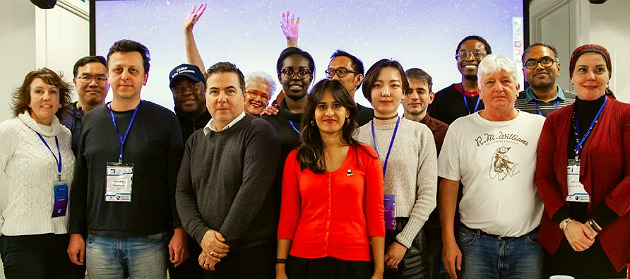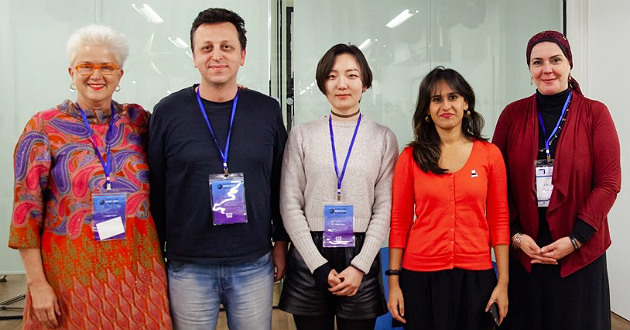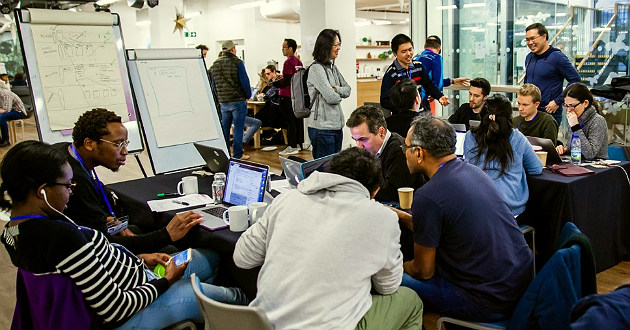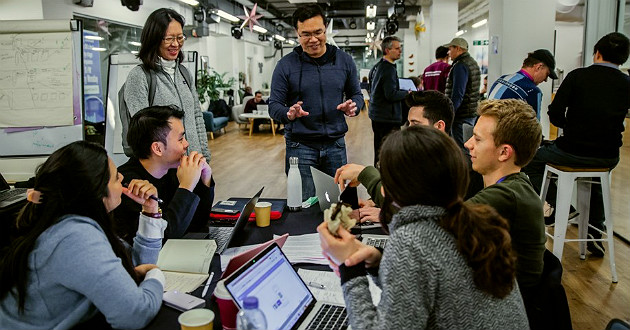The Partnership for Maternal, Newborn & Child Health (PMNCH) held a three-day hackathon during London Blockchain Week from 8 to 10 February 2019. The co-hosted event with Fintech Worldwide was dedicated to developing and exploring innovative blockchain solutions focused on improving women’s, children’s and adolescents’ health and wellbeing (WCAH) everywhere.
Over the weekend, 190 people attended the hackathon. Eleven teams made up of youth and people from different backgrounds and skillsets got together to develop sustainable models and digital solutions that addressed aspects of women’s, children’s and adolescents’ health and wellbeing. These solutions touched on areas such as humanitarian settings; accountability and tracking of progress; social influencing for/and interventions to improve WCAH; fundraising and distribution; development of global platforms to connect people; and advocating for WCAH to remain a priority on political and development agendas. The Hackathon was the brainchild of Dr Jane Thomason, who has pioneered the use of Hackathons to solve social impact challenges. She has been behind global social impact Hackathons on financial inclusion, improving basic service delivery, global hunger and gender equity. She was both a host and a judge for the PMNCH Hackathon.

Blocktrail
The winning team Blocktrail, represented by Udita Banerjee, Yanting Shen and Eridinc Mutlu presented a pitch for a digital Identity platform designed specifically for migrant and displaced women, children and adolescents. The platform would allow them to securely store their health data and gain access to important health services.

BlockTrail is an innovative service that helps women and children in humanitarian settings. It is a digital platform which allows migrant women, children to; store their digital ID securely as smart contracts on a private blockchain; control sharing of information; connect to communities; and access vital healthcare services. Blocktrail aims to initially help over 100,000 women and dependent children who have arrived in the UK as migrants in the past five years. The platform intends to tackle key challenges around data privacy & security, access to healthcare services, unclear related rules across the UK, language barriers and scams.
MUMs is the Word
MUMs is the Word came in second and aims to improve the state of tracking and transparency of healthcare funding focused on the health of pregnant mothers in crisis zones. Supported by global partnerships, this “Crystal Clear” platform aims to provide a more transparent, collaborative and better controls to deliver healthcare services in hard to reach and crisis areas. The platform uses blockchain and smart contracts to enable global transactions, track progress and connect with Healthcare providers in the regions.

Thrive
Finally, Thrive, one of the eleven teams, won a special mention from the judges for their project, idea and team. Thrive is a mental health platform that aims to connect vulnerable populations including women and children with individuals and organisations within the community who can provide critical support. The platform allows individuals to sign up to provide/ or seek mental health support. With the blockchain technology, Thrive allows refugees the power to control their data and create a digital health profile which can transcend borders. Key benefits provided by Thrive include access to support for healthcare services delivery (transport and expense), community outreach and support within camps, as well as the ability to anonymous request for support services to protect the privacy of women especially those who are victims to gender-based violence.

Blockchain and frontier technology can significantly help us to achieve the Sustainable Development Goals (SDGs) and improving the health and wellbeing of women, children and adolescents worldwide. At PMNCH, we will be continuing to explore different digital health innovations which can significantly help to achieve the SDGs and improve the health and wellbeing for WCAH.
Hackathons are fantastic bottom-up approaches to uncovering fresh perspectives, driving innovation and testing new ideas which could drastically improve the health of women, adolescents and children. Strategic partnerships, funding and support, are needed to accelerate these projects to the next level.

.png?sfvrsn=6d0e27cd_1)



